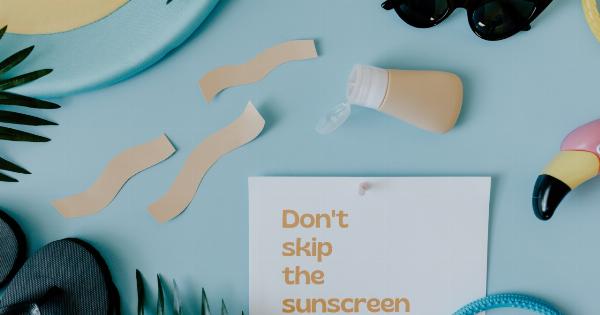During pregnancy, it is crucial to protect your skin from harmful sun rays. However, many conventional sunscreens in the market contain chemicals that can potentially harm both you and your developing baby.
To ensure the safety of your skin and your little one, it is essential to opt for non-toxic sunscreens specifically formulated for pregnancy.
Understanding the Risks of Conventional Sunscreens
Traditional sunscreens often contain chemicals like oxybenzone, avobenzone, and octinoxate, which can easily penetrate the skin and get absorbed into the bloodstream.
Studies have shown that these chemicals may have adverse effects on hormone regulation and potentially cause developmental issues in unborn babies.
The Importance of Non-toxic Sunscreens
Non-toxic sunscreens are specifically formulated to be safe for pregnant women, as well as for breastfeeding mothers.
These sunscreens use mineral-based ingredients, such as zinc oxide and titanium dioxide, which create a physical barrier on the skin to reflect and scatter the sun’s harmful rays.
Key Considerations for Non-toxic Sunscreens
When choosing a non-toxic sunscreen for pregnancy, consider the following factors:.
1. Mineral-based Formulas
Look for sunscreens that use mineral filters like zinc oxide or titanium dioxide, as they are less likely to cause skin irritations or allergic reactions. These minerals work by sitting on top of the skin and reflecting the sun’s rays.
2. Broad-spectrum Protection
Ensure that the sunscreen you choose provides broad-spectrum protection, shielding your skin from both UVA and UVB rays. UVA rays can lead to premature aging, while UVB rays are responsible for sunburns.
3. SPF Rating
Select a sunscreen with a sun protection factor (SPF) of 30 or higher. The SPF number indicates the level of protection against UVB rays.
Keep in mind, however, that no sunscreen can provide complete protection, so it’s essential to practice other sun-protective measures as well.
4. Hypoallergenic and Fragrance-free
Pregnancy can make your skin more sensitive, so it’s best to choose a sunscreen that is hypoallergenic and fragrance-free to minimize the risk of irritation or allergic reactions.
5. Avoid Retinyl Palmitate
Avoid sunscreens that contain retinyl palmitate, a form of vitamin A. While vitamin A is generally beneficial for the skin, some studies suggest that it may increase the risk of birth defects when applied topically in large amounts.
6. Choose Creams or Lotions over Sprays
While spray sunscreens may seem convenient, it’s best to opt for creams or lotions during pregnancy. Sprays can be easily inhaled, and the safety of these spray particles is still a subject of debate.
7. Water Resistance
If you’re planning to spend time in the water, make sure to choose a sunscreen that is water-resistant. However, keep in mind that even water-resistant sunscreens need to be reapplied after swimming or excessive sweating.
8. Check for Third-party Certifications
Look for non-toxic sunscreens that have been certified organic or have received third-party certifications. These certifications ensure that the product has undergone rigorous testing and meets specific safety standards.
Alternatives to Sunscreens
In addition to using non-toxic sunscreens, other measures can also help protect your skin during pregnancy:.
1. Seek Shade
Stay in the shade, especially during peak sun hours, between 10 am and 4 pm. This reduces the direct exposure to harmful UV rays.
2. Wear Protective Clothing
Wear loose-fitting, lightweight clothing that covers your arms, legs, and a wide-brimmed hat that shades your face and neck.
3. Use Sunglasses
Wear sunglasses with UV protection to shield your eyes from the sun’s harmful rays.
4. Stay Hydrated
Drink plenty of water to keep your body hydrated. Proper hydration also promotes healthy skin.
Conclusion
Protecting your skin during pregnancy is of utmost importance, especially when it comes to sun exposure.
By choosing non-toxic sunscreens specifically formulated for pregnancy and taking additional sun-protective measures, you can safeguard both your skin and your developing baby from harmful UV rays.





























